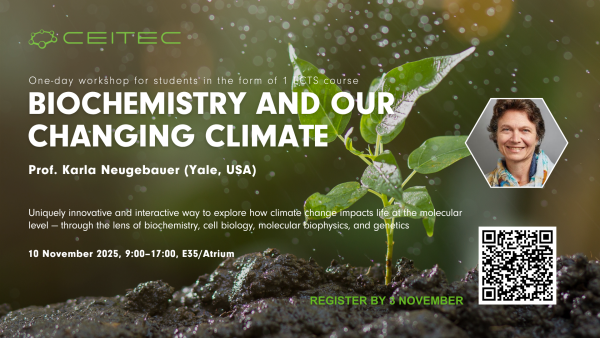About event
We invite advanced Master’s students (in their final year), PhD candidates, and postdoctoral researchers to join this workshop led by Professor Karla Neugebauer from Yale University — a distinguished scientist and leading expert in RNA biology and molecular biophysics. The workshop will feature a highly innovative, interactive, and eye-opening teaching approach that engages participants in exploring how climate change acts at the molecular level.
Climate change is impacting how cells and organisms grow and reproduce. Imagine the ocean spiking a fever: cold-blooded organisms of all shapes, sizes and complexities struggle to survive when water temperatures go up 2-4 degrees. Some organisms adapt to extremes, while others cannot. Predicted and observed changes in temperature, pH and salt concentration do and will affect many parameters of the living world, from the kinetics of chemical reactions and cellular signaling pathways to the accumulation of unforeseen chemicals in the environment, the appearance and dispersal of new diseases, and the development of new foods. In this course, we will approach climate change from the molecular point of view, identifying how cells and organisms – from microbes to plants and animals – respond to changing environmental conditions. To embrace the concept of “one health” for all life on the planet, this course will leverage biochemistry, cell biology, molecular biophysics and genetics to develop an understanding of the impact of climate change on the living world. We will consider the foundational knowledge that biochemistry can bring to the table as we meet the challenge of climate change.
Learning Objective: Students will learn to apply biochemical thinking to climate issues
Prerequisites: Participants are expected to have a background in biochemistry. The workshop is designed for advanced Master’s students (typically in their final year), PhD candidates, and postdoctoral researchers.
Capacity: 40 participants
Registration deadline: 24 October 2025 (18:00)
Programme
- 9:00–11:00 Block 1
Lecture: How is biochemistry a climate issue? Climate change effects on organisms.
Topics: Coral bleaching; temperature, salt and pH changes; acclimation and adaptation.
Journal Club: How tardigrades survive desiccation.
- 10:30–11:00 Coffee Break (will be integrated with the journal club)
- 11:00–13:00 Block 2
Lecture: Biochemistry & Architecture, protein engineering for renewable materials
Journal Club: Discovering of plastic-degrading enzymes in insect saliva
- 13:00–14:00 Lunch
- 14:00–16:30 Block 3
Lecture: Synthetic biology solutions to the Anthropocene, alternative foods.
World Café: Imagining climate biochemistry projects you would be excited to do
- 16:30–17:00 Reception
More information
During journal clubs:
The participants are expected to read in class selected sections of an assigned scientific article, present to peers, and discuss climate relevance.
Senior students or postdocs are welcome to volunteer as discussion leaders — a great opportunity to practice moderating skills. If you’re interested, please indicate this in the registration form above.
During World Café:
There will be two rounds of generating ideas for research projects from provided prompts, and then proposals will be shared with the whole group.
Credit information:
The workshop is also offered as a 1-credit course in the Masaryk University Information System. Master’s and PhD students can request enrollment through their faculty study office. Before enrolling in the course, students must register using the registration form above.


 Share
Share


